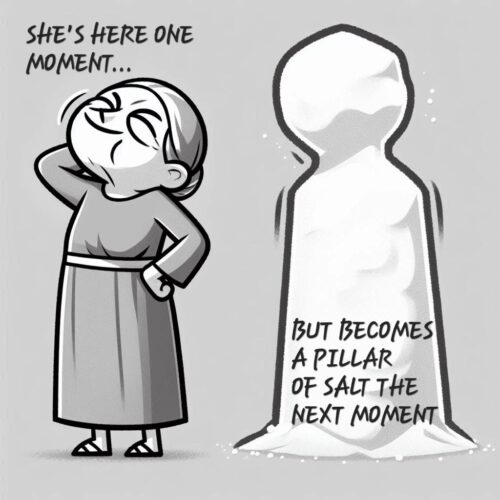Why Did God Punish Lot’s Wife? What Was Her Sin?
The account of Lot’s wife turning into a pillar of salt (Genesis 19:26) is one of the most striking examples of divine judgement in all of Scripture. While seemingly brief, the Bible narrative carries profound theological significance, particularly within Reformed thought. Join us as we analyse and examine the nature and implications of her sin
THE IMMEDIATE BIBLICAL CONTEXT
The context of Lot’s wife’s sin is set against the dramatic backdrop of Sodom and Gomorrah’s destruction. God’s command through the angels was explicit: “Flee for your lives! Don’t look back, and don’t stop anywhere in the plain!” (Genesis 19:17). The command served as a crucial test of faith: God not only intended Lot should leave the city, but also that he should hasten far away from it. The urgency of the moment highlighted the necessity of immediate, unquestioning obedience to divine instruction.
THE PRIMARY SIN: UNBELIEF
Matthew Henry, in his comprehensive commentary, identifies unbelief as the root sin of Lot’s wife. He writes her looking back demonstrated “distrust of the divine power and goodness that had promised to secure them.” Her unbelief manifested in a momentary action, but revealed a deeper heart condition.
Herman Bavinck, in his Reformed Dogmatics, connects her unbelief to the broader pattern of covenant unfaithfulness in salvation history. He argues her action represented not merely disobedience to a specific command but a fundamental rejection of God’s covenant promises and protection.
SECONDARY ASPECTS OF HER SIN
The attachment to Sodom represents a significant aspect of her sin. Jonathan Edwards, in his sermon “The Folly of Looking Back in Fleeing Out of Sodom,” emphasises her backward glance revealed a heart still tethered to the world she was commanded to abandon. Edwards writes, “Her heart was with Sodom… and this was the cause of her looking back.”
Francis Turretin addresses this aspect of her willful disobedience, arguing her action demonstrated a deliberate rejection of divine authority. This perspective aligns with the Reformed emphasis on the absolute sovereignty of God and the requirement of complete submission to His commands.
JESUS’ REFERENCE TO LOT’S WIFE
Christ’s brief but pointed reference to Lot’s wife in Luke 17:32 (“Remember Lot’s wife”) elevates this incident to paradigmatic status. John Owen, in his writings on perseverance, uses this reference to illustrate the danger of false profession and temporary faith. He argues Christ’s warning serves as a perpetual reminder of the necessity of perseverance in faith.
THEOLOGICAL IMPLICATIONS
The incident carries significant implications for Reformed soteriology. Abraham Kuyper, in his work on common grace, uses this account to illustrate the distinction between true and false faith. Lot’s wife, argues Kuyper, represents those who experience the external benefits of covenant association without genuine saving faith.
The Reformed tradition emphasises her sin reveals the inseparable connection between faith and obedience. As Calvin notes, “Faith is not a bare knowledge either of God or of His truth; but a firm and steady confidence… which yields free and fearless obedience to God.”
CONCLUSION: WHY DID GOD PUNISH LOT’S WIFE?
The sin of Lot’s wife, seen in the light of Scripture, transcends mere disobedience to a specific command. It represents a fundamental failure of faith, revealing the serious nature of unbelief and the danger of divided loyalties in the Christian life. Her example is a perpetual warning against half-hearted discipleship and the deadly peril of looking back once we’ve put our hands to the plough in following Christ.
This account reinforces core Reformed emphases on divine sovereignty, the necessity of genuine faith, and the inseparable connection between true faith and obedience. As modern readers consider this ancient account, the words of Christ continue to echo with solemn significance: “Remember Lot’s wife.”
WHY DID GOD PUNISH LOT’S WIFE?—RELATED FAQs
Why did God punish Lot’s wife but spare Job’s wife? The key distinction lies in both the nature and context of their respective sins. Lot’s wife directly defied an explicit divine command during a moment of judgment and salvation, demonstrating unbelief in God’s power to save and attachment to the world under judgment. Her action was a willful disobedience during a crucial moment of divine intervention, representing a fundamental rejection of God’s mercy and salvation.
In contrast, Job’s wife’s sin occurred within the context of a divine testing, where her bitter words and counsel became part of Job’s trial rather than an act of direct defiance against a specific divine command. Moreover, as Reformed theologians such aswz Matthew Henry note, her preservation served God’s larger purpose in Job’s testing, and she ultimately became a recipient of God’s restoration along with Job’s household (Job 42).
- Was Lot’s wife’s punishment disproportionate to her sin? Reformed theology emphasizes that looking back was not merely a physical action but represented fundamental unbelief and rejection of God’s mercy. The severity of her punishment reflects both the gravity of spurning divine salvation and the importance of her example as a warning to future generations, as Jesus himself referenced (Luke 17:32).
- Do we know Lot’s wife’s name? Scripture doesn’t record her name, though some Jewish traditions call her “Edith” or “Ado.” The anonymity may serve to emphasise the universal application of her example, focusing on her action rather than her identity.
- Why did she specifically turn into salt? The transformation into salt likely served multiple purposes: it provided a visible memorial in a salt-rich region, symbolised the preservative nature of the warning, and possibly connected to the salt deposits near the Dead Sea. Calvin suggests it demonstrated God’s power to transform the very substance of human flesh as a warning to others.
- Did Lot’s wife receive any warning before her punishment? Yes, the angels explicitly commanded her family not to look back (Genesis 19:17). The command was clear and came with the urgent context of divine judgment, making her disobedience a conscious choice rather than an ignorant mistake.
- Was Lot’s wife saved (in terms of eternal salvation)? Most Reformed theologians view her as an example of one who had external association with God’s covenant people but lacked true saving faith. Her action revealed her unregenerate heart, similar to Jesus’s warnings about those who “put their hand to the plough and look back” (Luke 9:62).
- Could Lot’s wife’s fate have been different if she had repented immediately on looking back? Scripture doesn’t explore this hypothetical scenario, but Reformed theology emphasises her looking back revealed a heart condition rather than merely a momentary lapse. The instantaneous nature of her judgment suggests it was God’s sovereign purpose to use her as an enduring example of the dangers of worldliness and unbelief.
WHY DID GOD PUNISH LOT’S WIFE?—OUR RELATED POSTS
Editor's Pick

Paul’s Mandate for Men: Headship Or Servant Leadership? Or Both?
Modern Christianity has fallen into a trap. We've created an either/or battle between "headship" and "servant leadership," as if these [...]

Should We Stop Using Male Pronouns for God? Why Do We Say No?
A friend of ours arrived eagerly at his first theology class in seminary. But he quickly discovered something troubling: the [...]

Did Old Testament Law Force Women to Marry their Rapists?
**Editor’s Note: This post is part of our series, ‘Satan’s Lies: Common Deceptions in the Church Today’… Viral misinformation abounds [...]

From Danvers To Nashville: Two Statements, One Biblical Vision
30 years separate the Danvers Statement on Biblical Manhood and Womanhood (1987) and the Nashville Statement on Human Sexuality (2017). [...]

The Nashville Statement: Why Affirm It Despite Media Backlash?
WHY DO REFORMED CHRISTIANS STAND BY THIS STATEMENT ON MARRIAGE AND GENDER? When the Nashville Statement was released in 2017, [...]

Who Is Belial? Solving The 2 Corinthians 6:15 Mystery
Belial: This name from the pages of Scripture chills the soul. Who is this mysterious figure Paul invokes in 2 [...]

Celibacy Or Castration: What Jesus Really Means in Matthew 19:12
One of Scripture's most shocking misinterpretations led theologian Origen to castrate himself in the third century. His tragic mistake? Taking [...]

Philippians 4:13: Did Paul Really Mean We Can Do ALL Things?
"I can do all things through Christ who strengthens me." It's on gym walls, graduation cards, and motivational posters everywhere. [...]

The Ordinary Means of Grace: Why Are They Indispensable?
ORDINARY MEANS FOR EXTRAORDINARY TRANSFORMATION What if God's most powerful work in believers' lives happens through the most ordinary activities? [...]

Is the Bible God’s Word? Or Does It Only Contain God’s Word?
The authority of Scripture stands at the crossroads of modern Christianity. While some argue the Bible merely contains God’s Word [...]
SUPPORT US:
Feel the Holy Spirit's gentle nudge to partner with us?
Donate Online:
Account Name: TRUTHS TO DIE FOR FOUNDATION
Account Number: 10243565459
Bank IFSC: IDFB0043391
Bank Name: IDFC FIRST BANK






